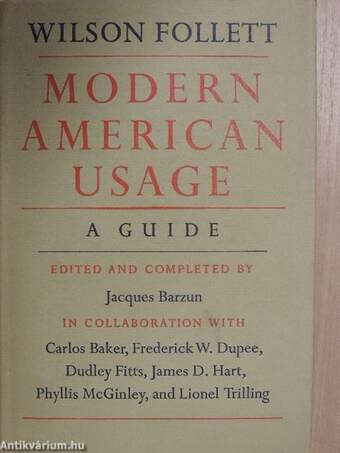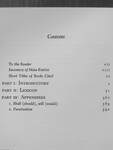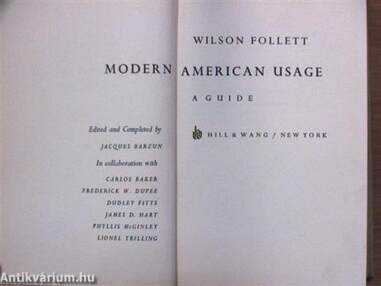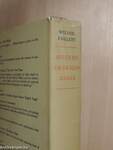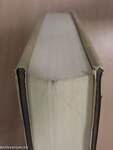1.067.339
kiadvánnyal nyújtjuk Magyarország legnagyobb antikvár könyv-kínálatát

VISSZA
A TETEJÉRE
JAVASLATOKÉszre-
vételek
Modern American Usage
A guide
| Kiadó: | Hill & Wang |
|---|---|
| Kiadás helye: | New York |
| Kiadás éve: | |
| Kötés típusa: | Fűzött keménykötés |
| Oldalszám: | 436 oldal |
| Sorozatcím: | |
| Kötetszám: | |
| Nyelv: | Angol |
| Méret: | 22 cm x 15 cm |
| ISBN: | |
naponta értesítjük a beérkező friss
kiadványokról
naponta értesítjük a beérkező friss
kiadványokról
Fülszöveg
It is time we had an American book of
usage grounded in the philosophy that
the best in language—which is often the
simplest—is not too good to be aspired
to.
These words were set down by Wilson
Follett when, in 1958, he began to write
Modern American Usage. They may be
taken as stating the principle underlying
his book. Throughout Modern American
Usage Wilson Follett maintains that the
best in language is attainable and worth
the effort, that in matters of expression
the speaker and writer must exercise choice
and judgment.
Modern American Usage, an invaluable
guide to educated usage and good taste,
is filled with Wilson Follett's wit and
erudition. It is intended to be read with
pleasure and to be used by those who are
interested in good English—and it is
American, "American to the marrow," as
Wilson Follett hoped it would be. Mod-
ern American Usage will take its place
beside the classic reference works of Bart-
lett, Roget, and Fowler.
Mr. Follett's... Tovább
Fülszöveg
It is time we had an American book of
usage grounded in the philosophy that
the best in language—which is often the
simplest—is not too good to be aspired
to.
These words were set down by Wilson
Follett when, in 1958, he began to write
Modern American Usage. They may be
taken as stating the principle underlying
his book. Throughout Modern American
Usage Wilson Follett maintains that the
best in language is attainable and worth
the effort, that in matters of expression
the speaker and writer must exercise choice
and judgment.
Modern American Usage, an invaluable
guide to educated usage and good taste,
is filled with Wilson Follett's wit and
erudition. It is intended to be read with
pleasure and to be used by those who are
interested in good English—and it is
American, "American to the marrow," as
Wilson Follett hoped it would be. Mod-
ern American Usage will take its place
beside the classic reference works of Bart-
lett, Roget, and Fowler.
Mr. Follett's literary attributes were
perhaps best summed up by Edward
Weeks:
Wilson Follett, who contributed on many
occasions to the Atlantic during my edi-
torship, was a tart and vigorous defender
of the English language. He loved words
and he had a Roman's reverence for clar-
ity and order in a sentence. I rank him
with H. W. Fowler as one of the two
liveliest champions of good English usage
in our time.
Wilson Follett died in 1963, before he
had finished his book. Jacques Barzun,
with the co-operation of his collaborators,
undertook the task of completing it. Vissza
Témakörök
- Idegennyelv > Idegennyelvű könyvek > Angol > Szótárak
- Nyelvészet > Idegen nyelvek > Tanulása
- Nyelvészet > Idegen szavak, kifejezések
- Szótárak > Nyelvsajátosságok > Anglicizmusok
- Szótárak > Idegennyelvű szótárak > Angol
- Idegennyelv > Nyelvtanulás > Nyelvtanítás > Nyelvkönyv
- Idegennyelv > Nyelvtanulás > Nyelvtanítás > Oktatási nyelv > Idegennyelvű
- Idegennyelv > Nyelvtanulás > Nyelvek > Angol > Kézikönyv
- Idegennyelv > Nyelvtanulás > Nyelvek > Angol > Szótár



